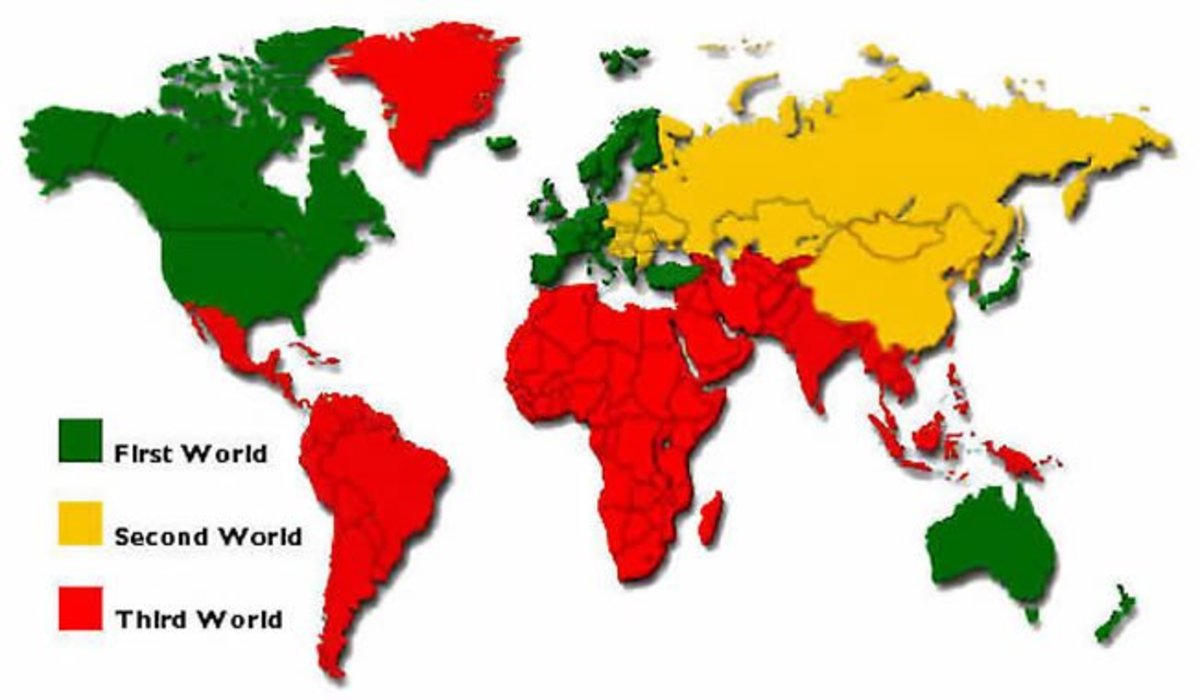There Will Be Always People Who Are "More"-Smarter, Educated, and Wealthier-So What, Accept and Live With It!

Socioeconomic Stratification is an Undeniable Fact of Life
The American Constitution states and rightfully so that all humankind are created equal with certain unalienable rights. We were inculcated with this premise. Many people, based upon these principles, furthermore assert that there should be a totally classless society.
These people portend that most of the problems in postmodern society stems from "inequalities" pertaining to socioeconomic and related components. They maintained that should be no stratification in society based upon the aforementioned premises. These are the people who strongly contend and advocate that there should be wealth distribution to level the so-called income disparity among the upper, middle, and lower classes.
Such a premise regarding income equality is totally unrealistic and fantastical to put in mildly. There has always been stratification based upon socioeconomic factors among other things. This is an undeniable fact of life and will never change.
From the beginning of civilization, there has been socioeconomic and sociocultural stratification. Socioeconomic class was often extremely instrumental as to the way people are treated in society. In many ancient and medieval civilizations, the upper and educated classes were granted respect because of their power and knowledge. In some societies, the upper and learned classes, particularly kings, queens, priests, priestess, popes, and other highly placed dignitaries were accorded divine and/or godlike status.
Because of their standing in ancient and medieval societies, the upper and learned classes established the parameters which the poorer classes followed whether it was common law and/or canon law. In other words, the upper and learned classes possessed the power and/or knowledge that the other classes did not. The upper and learned classes further inculcated their children, grooming them how to responsibly use their power and knowledge.
Conversely, the lower classes were considered to be nonentities and therefore considered to be easily expendable by the upper and learned classes. The lower classes, particularly in ancient and medieval societies, believed that they were destined to be poor and downtrodden. They were further placated by those in authority to accept their status as preordained. Yes, there were some lower class people who proceeded to advance to a more affluent status but because the ancient and medieval socioeconomic class system was rigidly stratified, such upward mobility was atypical.
The middle class did not come into preeminence until the latter part of the medieval period. At the epoch of the early modern period, there was a significant increase in the middle class i.e. merchants, traders, entrepreneurs, and other businessmen. Even though there was a significant increase in the middle class, there were still the lower, uneducated, unskilled classes and the upper and learned classes.
As society became more modernized, there was more social mobility among the classes either voluntarily or involuntarily. In the modern era, many members of the lower classes rightfully protested their socioeconomic status for more and varied economic and educational opportunities. Take for instances, the liberation of the peasant and serf classes throughout Europe in the 18th and 19th centuries. There were people who advocated for the poorer classes to advance into the more affluent classes. However, there were people who believe that socioeconomic class stratification system was an inherent evil and vehemently advocated for the total eradication of the class system particular Karl Marx and Frederich Engels, who were proponents of a more equal socioeconomic system.
This system was called communism. Even though the early communists advocated for a more egalitarian socioeconomic system, many communist countries had socioeconomic stratification where the more privileged class had more and/or unlimited to education and other social services while the less privileged classes had to be on a waiting list to obtain even the most basic necessities. However, from the period of the late 1980s to the 1990s and beyond, it was acknowledged that communism was totally futile and people under the Eastern Europe and Russian communist hegemony wanted a better socioeconomic system which guaranteed a much better reward system for their work.
Despite many pundits wanting to eliminate the present socioeconomic class system, it is a one in a million chance that it will occur. Even so-called communist China has an increase in wealthy and educated people. There is even a saying in China that to be rich is glorious. There is no escaping this!
Even though we believe there is no job and socioeconomic class that is more than the other. Subconsciously, we know better. In many societies, status and respect are attached to jobs based upon degree of specialization, years of schooling, and/or societal respect attached to the respective job. In essence, the more complex, skilled, and more difficult the requirements for the job is, usually the higher the pay and status. In most societies, a doctor is more respected than a laborer because of the years of schooling and the specialization that the doctor receives.
The status of a job and/or career varies from era to era. Previously, there was status in having a skilled blue collar job ; however, with the increase in education and automation, such jobs were being eliminated and many skilled blue collar employees found themselves displaced. In this postmodern era, many highly educated, professional employees are being displaced because of the outsourcing of jobs to save corporate costs. These highly educated, professional employees, if they want to have job parity, must consistently update and upgrade their skills.
The high status and/or high paying jobs are now in the technical and scientific fields. This is a fact of life because of the constant computerization of a postindustrial and postmodern society. In fact, being highly proficient in a computer is extremely necessary to have a well-paying job. In addition to that, many well-paying jobs require advanced education e.g. Master's and Doctor of Philosophy Degrees. A Bachelor's Degree, even in the hard, technical sciences, no longer suffices regarding obtain a decent job. The playing field regarding jobs is becoming more ruthless and cutthroat with the adage of the survival of the most savvy and ruthless.
Those who elect not to upgrade and adopt their skillset and/or education are becoming the newly poor and are being left behind. Those who were once middle and/or upper middle class are becoming the new poor. That is a fact of life no more and no less. The poor, already being in a socioeconomic quagmire, are slipping through the cracks to a place of no return. Yes, we are in future shock and the new frontier, like it or not!
Now back to socioeconomic and sociocultural stratification. What socioeconomic class one is in, either by origin and by earnings, influences the way he/she is perceived by others. Socioeconomic class is a determinant as to type of health care one receives, what quality of life one has, what type of education one's children receive and/or eventually obtain, lifestyle choices, and whether one has financial freedom to pursue his/her dreams or has to constantly struggle just to survive.
Many people love to lull themselves into believing that there should be socioeconomic equality but search is not necessarily the chance. Wealthier people are more respected and receive more privileges than either the middle and/or lower socioeconomic classes. The former are usually in powerful and in take charge positions where they are in demand either because of their education, skills, or a combination of the two. The average wealthy person studied, planned, sacrificed, and strategized to be where they are. They also have a different philosophy of achievement and success. They are also proactive and own their lives.
Some members of the middle and upper middle class also have a proactive approach to achievement and success. They, too, used intelligent and strategic planning to achieve their respective goals. Conversely, many members of the lower middle and lower socioeconomic classes have a passive approach to life and achievement. Many lower middle and/or lower socioeconomic class individuals are often less educated and skilled than those of the more affluent classes. They are believe that they are subject to their respective fate and that circumstances cannot be controlled. In essence, they let life happen to them instead of determining their own destiny. Many of the latter are quite distrustful of the wealthier classes because the latter has a more proactive and positive attitude towards educational and achievement attainment. They tend to blame others for their lack of socioeconomic achievement instead of looking inward. They are victims and whiners, instead of winners.
However, many members of the lower middle and lower classes are the main proponents for equal income distribution. They vehemently contest the "greed" and "elitism" of the more affluent classes, believing that life should be equal. Well, it does not go that way. Usually, the rewards of income is placed upon the nature of work involved. Simple mathematics, do you think. As much as they want the rich to relinquish their income, that is definitely not going to occur so live with it and accept the fact that there is always going to social class stratification!
There is always going to be someone who is and will be "more"- whether it is wealth, educational, and/or other variables. The idea that all and everything should be equal is totally a quite unrealistic premise. This is neither true in the animal and natural world and society determines that it is also in human society.
In summation, although we steadfastly maintain equality in many areas of life, all is not equal particularly in regards to socioeconomic stratification. There has always been a class system in society from time immemorial. People are often perceived and judged based upon their socioeconomic class. If it is not over, it is often covert. Wealthier people are given more privileges and respect than less affluent people based upon their educational and skill level. In addition to that, job and income status is often dependent upon societal need and the amount of education and skills required.
The status of jobs and career vary from era to era. In an earlier era, semiskilled jobs paid well and were valuable; however, with increasing automation, mechanization, and computerization, jobs are increasingly becoming more complex. In this postmodern, computerized era, those who have the prerequisite education and skill set will be the affluent ones while those without it, will become poorer and will be left behind. People have futilely attempted implementing income equality ranging from socialists and communists to other related persons. Such a premise will never come to fruition for there always been varied socioeconomic classes in its graduations. Welcome to the real world, folks!








